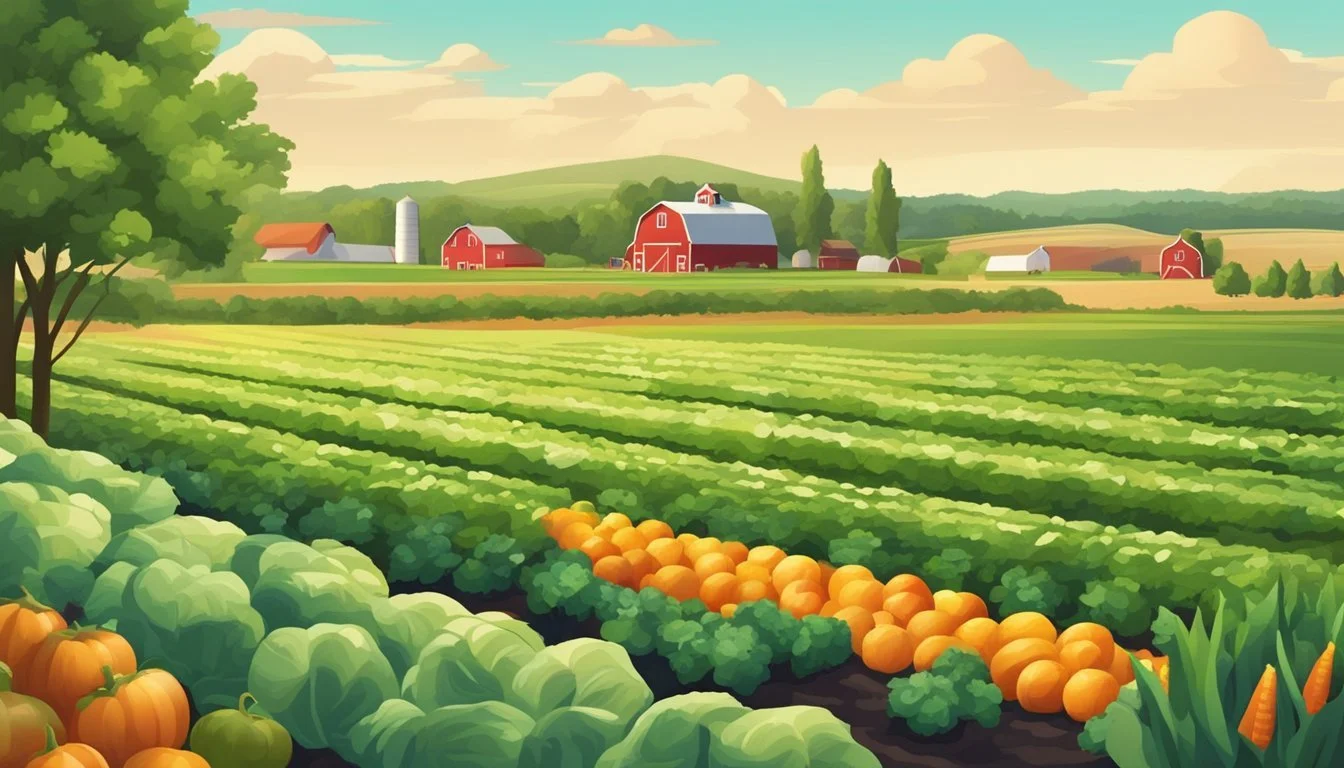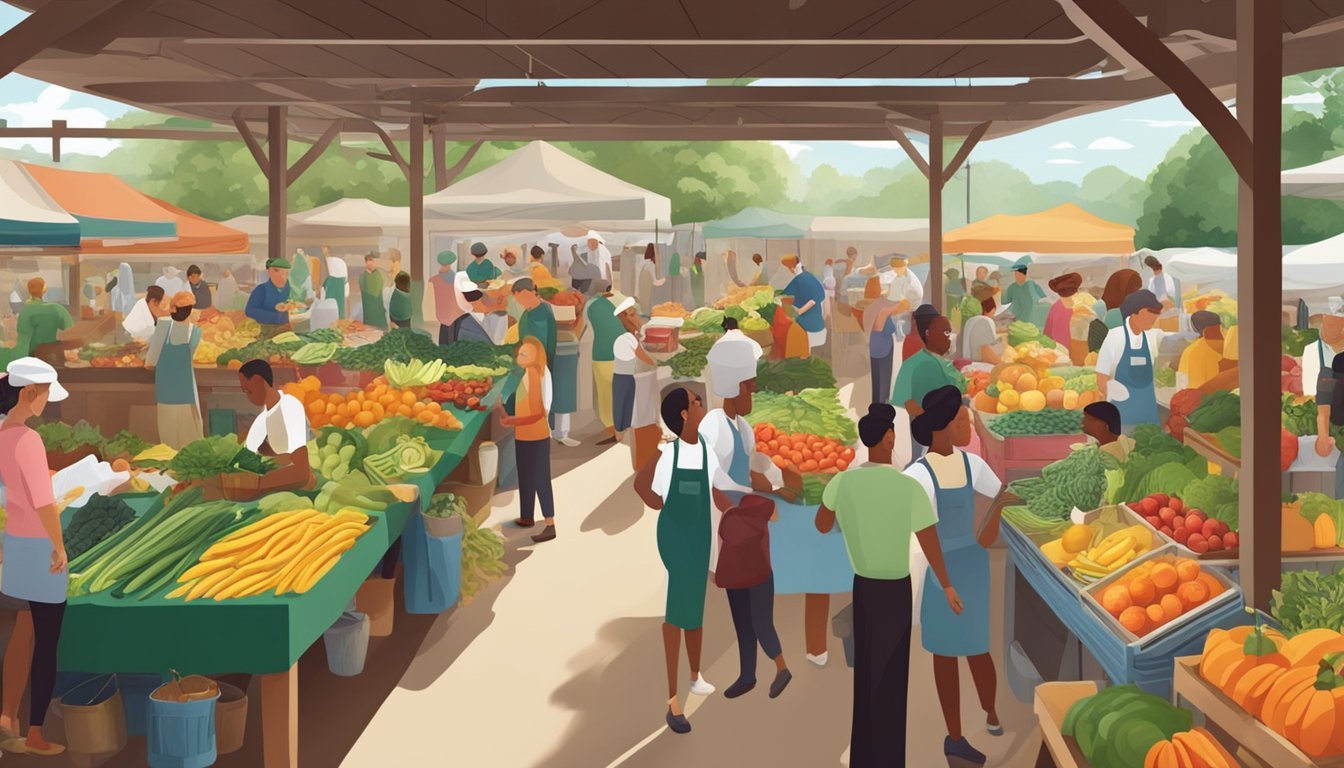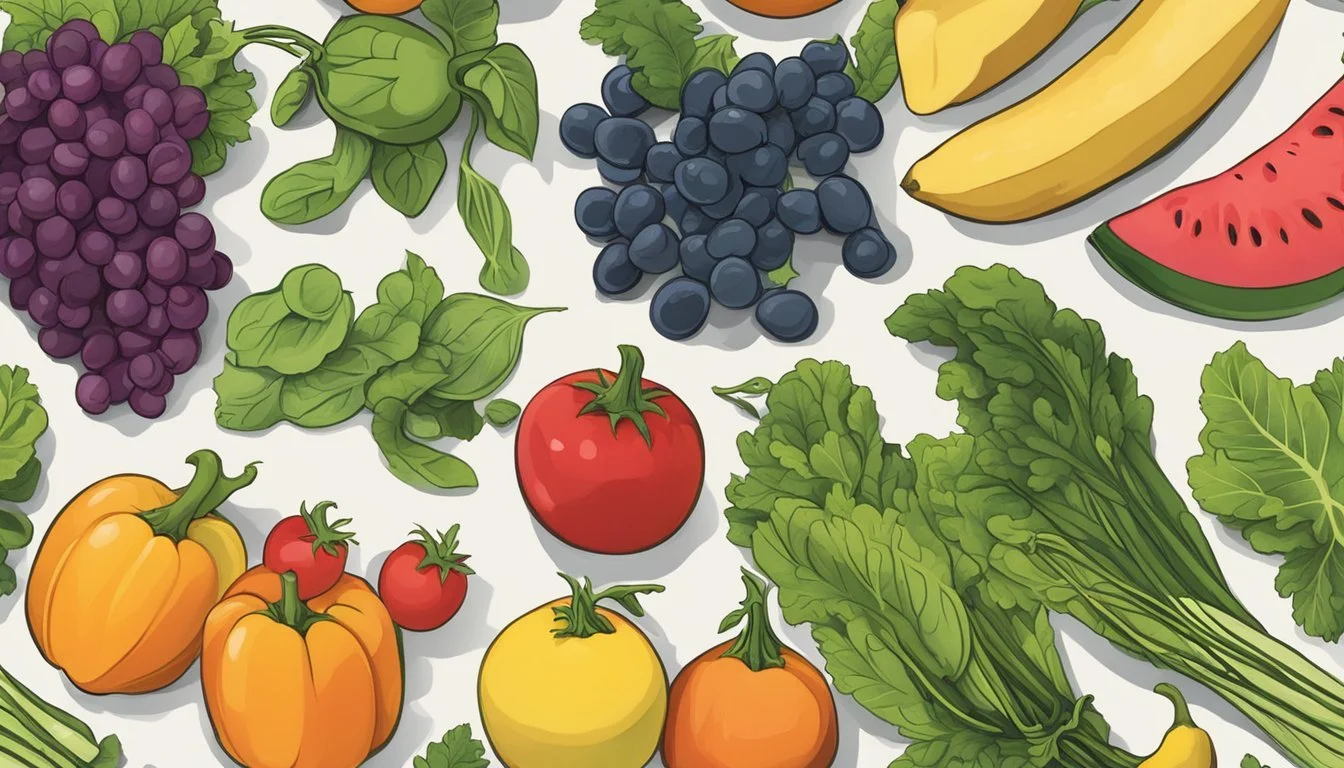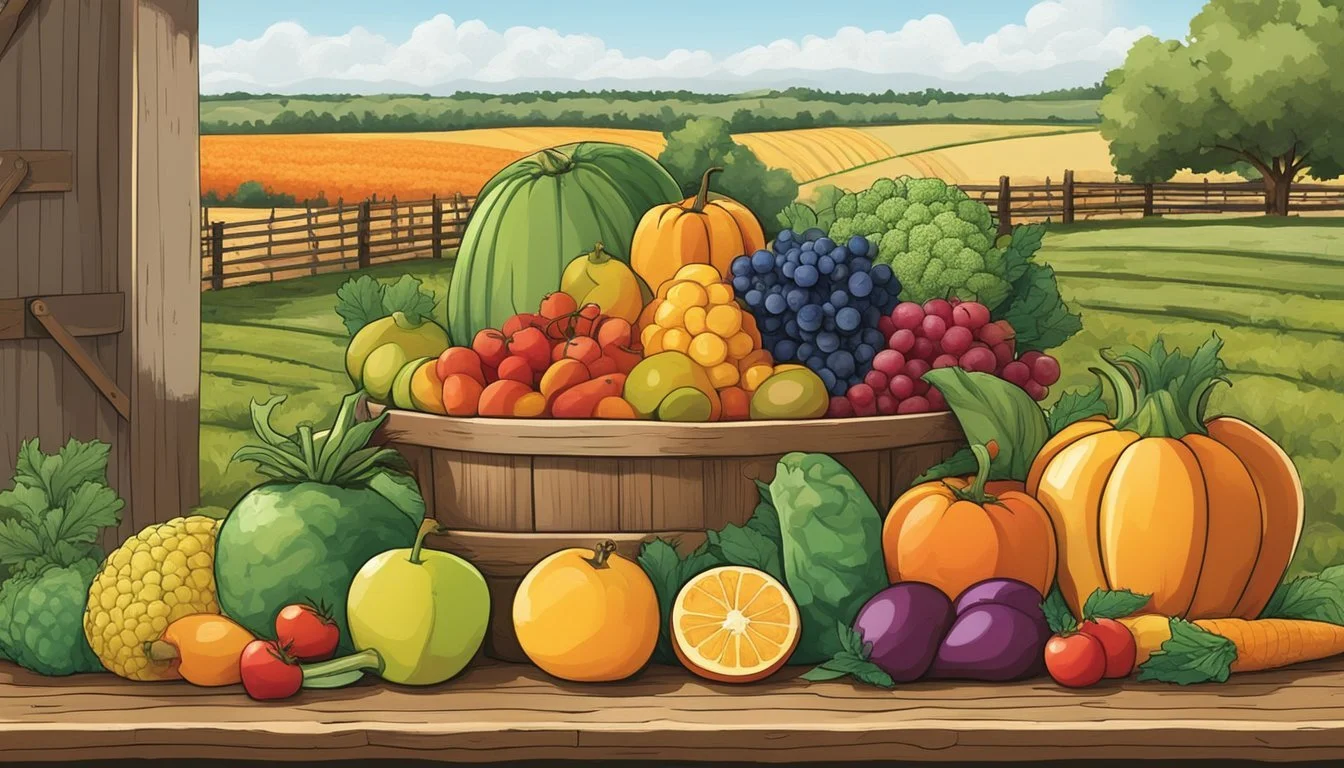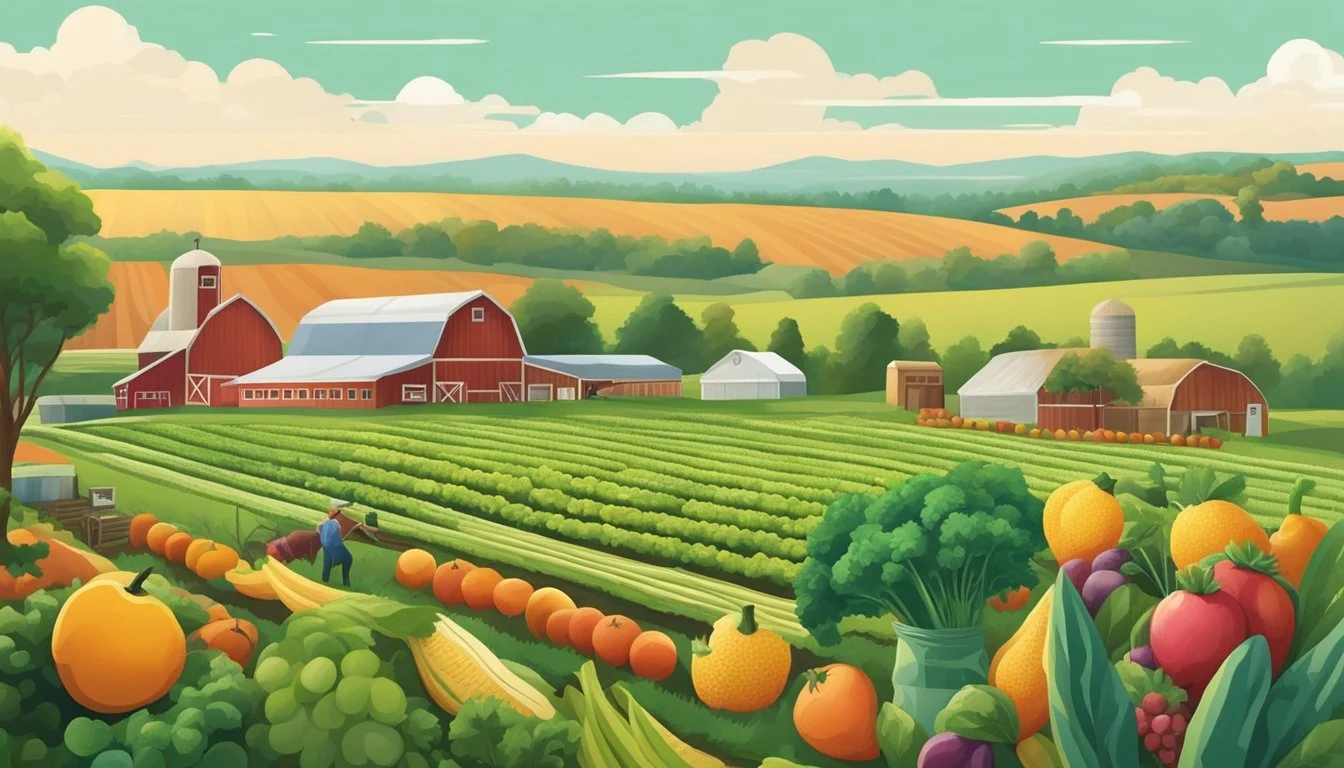Illinois Seasonal Fruit & Veg Guide
Your Year-Round Companion
In Illinois, the concept of farm-to-table is far from a fleeting trend. It’s a movement deeply rooted in the state's rich farming heritage, bringing fresh, seasonal produce from the fields to the dining table. With a diverse climate and fertile land, Illinois yields a bounty of fruits and vegetables that vary by season, providing a revolving menu of flavors throughout the year.
Farmers across the state diligently follow the natural cycles to harvest produce at its peak, ensuring maximum flavor and nutrition. From the vibrant asparagus (What wine goes well with asparagus?) spears of spring to the hearty squashes of autumn, each season offers its own palette of produce. This not only supports the local economy but also decreases the environmental impact associated with long-distance transportation of food.
The emphasis on local farming allows consumers to engage with the origin of their food, fostering a connection between growers and diners. With an array of farmers markets and restaurants championing the farm-to-table ethos, Illinois residents and visitors alike can experience the state’s agricultural variety in its freshest form.
What’s in Season in Illinois Right Now?
The Concept of Farm to Table in Illinois
In Illinois, the farm-to-table concept manifests as a symbiotic relationship between local agriculture and gastronomy, emphasizing environmental sustainability and economic stimulation.
Historical Development of Farm to Table
Farm-to-table is not a new trend in Illinois; it has historical roots that stretch back to a time when localized food systems were the norm. As society industrialized, food production and distribution became more centralized, and the distance between farms and consumers' plates increased. However, there has been a renaissance of the farm-to-table model, which originally sprang from a desire to return to more local, sustainable forms of agriculture and dining.
Current Farm to Table Movements
The farm-to-table movement in Illinois today is characterized by a commitment to sustainable and regenerative farming practices. Operations like Epiphany Farms lead the charge, epitomizing the integration of responsible farming into modern culinary experiences. This enterprise, founded by Bloomington native Ken Myszka, exemplifies a direct link between the field and the restaurant table, where they proudly serve what they grow using sustainable practices.
Sustainable Practices: Utilizing methods that prioritize environmental health and resource conservation.
Regenerative Farm: Aiming to restore soil and ecosystem health through natural processes.
Epiphany Farms Restaurant, along with others in the local food scene, champions the movement by crafting menus around the seasonal availability of their produce, thus supporting and promoting a more sustainable food network.
Influence of Farm to Table on Local Economy
The farm-to-table approach significantly impacts Illinois' economy. By directly sourcing from local producers, restaurants like Epiphany Farms Restaurant reduce food miles and ensure fresher ingredients, which resonates well with consumers. Consequently, this fosters a robust local economy, as money circulates within the community, supporting local farmers, creating jobs, and contributing to a sustainable economic model.
Economic Contribution: Increased employment opportunities and financial growth in local agriculture and hospitality sectors.
This farm-to-table trend not only fosters community engagement but also educates consumers about the origins of their food, creating a more informed public that values the importance of supporting local, eco-friendly agriculture.
Seasonal Cycles of Illinois Produce
Illinois offers a robust variety of fruits and vegetables that shift with the seasons, providing a fresh selection throughout the year. Each season boasts its own specialties, from tender greens in the spring to hearty squashes in the winter.
Spring Offerings
In spring, Illinois soil awakens with vegetables like asparagus, along with an array of herbs. Fruit-wise, the season is a bit quieter, but preparation for the abundance of summer begins.
Vegetables: Asparagus, herbs
Fruits: Preparatory stages for summer fruits
Summer Abundance
The summer months usher in a bountiful harvest where the selection grows vibrant and diverse. Juicy peaches, nectarines, plums, and cherries become ripe for picking. Corn and tomatoes reach their peak, alongside a variety of melons.
Fruits:
Apples (how long do apples last?): June onwards
Berries: Strawberries in June, other berries follow
Cherries: June and July
Melons: Variety available throughout summer
Nectarines, Peaches, Plums: Mainly June and July
Vegetables:
Corn: Mid-June through mid-August
Tomatoes: July through mid-October
Fall Harvest
Fall is celebrated with an extensive harvest of apples and a continuation of summer fruit. The vegetable patches offer chard and a second round of corn. Grapes hang heavy on the vine, ready for enjoyment.
Fruits:
Apples: Wide variety available
Grapes: Harvest commences
Vegetables:
Chard: Plentiful
Corn: Final yield before the cool weather sets in
Winter Selections
The winter season is quieter on the farms of Illinois, with a focus on storage crops and hearty winter vegetables. Though fruit is more scarce, the resilience of certain apple varieties provides options.
Fruits:
Apples: Storage varieties available
Vegetables:
Winter selections include stored root vegetables and winter greens
Illinois Farms and Farming Practices
Illinois is recognized for its diverse agricultural output, ranging from the vast fields of grains to vibrant orchards and vegetable farms. The farmers maintain a steadfast commitment to innovative practices that bolster sustainability and the regeneration of the land.
Sustainable Farming Methods
Farmers across Illinois are increasingly embracing sustainable farming methods. These techniques aim to minimize environmental impact, maintain soil health, and ensure the longevity of agriculture in the state. For instance, farmers implement crop rotation to preserve soil nutrients and prevent erosion, while others maintain pollinator-friendly habitats to support a healthy ecosystem. Additionally, the adoption of organic practices is steered by standards set by the USDA's National Organic Program, which includes the use of approved substances and the exclusion of genetic engineering in crops.
Crop Rotation: Optimizes nutrients in soil; prevents erosion.
Pollinator Habitats: Enhances farm biodiversity; supports ecosystems.
Organic Certification: Ensures adherence to approved USDA methods; fosters clean produce.
Regenerative Agriculture
Regenerative agriculture is another pillar of the state's farming ethos. This approach goes beyond preserving the status quo and actively enhances the fertility of the land. Illinois's farmers focus on soil regeneration techniques such as no-till farming, which reduces soil disturbance, and the application of natural composts that enrich the soil with organic matter.
No-Till Farming: Reduces soil disturbance; conserves water.
Organic Composting: Enriches soil; promotes robust plant growth.
These regenerative strategies not only produce nutrient-rich vegetables and fruits but also contribute to a more resilient farming system capable of withstanding climate-related challenges. As the Illinois agricultural community continues to grow, the integration of sustainable and regenerative methods solidifies its role as a leader in responsible farming practices.
Exploring Illinois’ Regional Specialties
Illinois boasts a diverse culinary landscape, with each region cultivating its own gastronomic identity through farm-to-table experiences. In Chicago and Bloomington, local produce elevates restaurant offerings, celebrating the state's agricultural richness.
Chicago’s Food Scene
Chicago, known for its vibrant food scene, integrates farm-fresh ingredients into a city-centric dining experience. Restaurants across the city commit to seasonal menus featuring locally sourced produce. Diners can find tables laden with a variety of Illinois' fruits and vegetables, reflecting the region's seasonal best.
Specialty Feature: Horseradish, with its robust flavor, is a distinctive Chicago favorite, often incorporated into inventive dishes that challenge the traditional palate.
Bloomington's Culinary Innovations
Bloomington, on the other hand, has become a hub for culinary creativity, where restaurants like Anju Above focus on innovative ways to present local produce. Bakery and Pickle, a concept known for its hand-crafted approach, ensures that fresh, regional ingredients are at the forefront of its culinary creations.
Local Highlight: The city takes pride in showcasing regional specialties such as sweet corn, integrating these ingredients into their offerings, thus supporting local agriculture and providing unique dining experiences.
Seasonality in Restaurant Menus
In Illinois, incorporating seasonal fruits and vegetables into restaurant menus not only enhances the dining experience with fresh flavors but also supports local agriculture. The trend towards seasonality in menu planning is apparent, providing diners with a taste that aligns with the natural produce calendar.
Menu Planning with Seasonal Ingredients
Chefs across Illinois design their menus around the changing seasons, selecting ingredients at the peak of their freshness and flavor. For instance, summer menus burst with berries and stone fruits, while fall brings an abundance of squash and root vegetables. In June, strawberries and asparagus often take center stage, whereas November menus might feature pumpkins and apples. This practice not only ensures optimal taste but also encourages sustainable agriculture and reduces the carbon footprint associated with food transport.
Showcase Restaurants Embracing Seasonality
Epiphany Farms Restaurant, a culinary destination, is an exemplar of leveraging seasonality. They transform simple produce into elevated dishes, like Snap Pea Focaccia paired with local goat cheese (how long does cheese last?)—a summer favorite. Anju Above utilizes seasonal produce to create contemporary Asian dishes, ensuring each ingredient, from bok choy to watermelon radishes, is at its most flavorful. Meanwhile, The Bakery and Pickle excels in preserving seasonal bounty, offering pickles and baked goods that reflect the tastes of the current season. These establishments aim to provide a connection between the table and the local land, crafting menus that vary as the Illinois harvest calendar evolves.
Community and Food Events
Community engagement and the celebration of local produce are vital components of Illinois' farm-to-table scene. Events throughout the state offer opportunities to experience the best of the harvest directly from the source.
Farmers Markets and Food Festivals
Farmers Markets: Illinois' farmers markets are bustling hubs where the community can directly purchase fruits and vegetables, often just picked from nearby farms and orchards. They serve as a critical event space where local growers can interact with consumers, fostering a deeper understanding of where their food comes from.
Chicago’s Green City Market: Known for its wide range of vendors, offering everything from heirloom tomatoes to freshly baked bread.
Urbana’s Market at the Square: Features not just produce, but also local artisanal products and street food.
Food Festivals: Illinois celebrates its agricultural bounty with numerous festivals throughout the year.
Illinois Products Farmers' Market: Held at the state fairgrounds, this event showcases a variety of Illinois-made products.
Long Grove Strawberry Festival: Offers a family-friendly experience centered around the peak strawberry season.
Exclusive Farm Dinners
Exclusive farm dinners are intimate events that highlight the connection between the farm and the dining table. The dinners are typically held on the farms themselves, offering a unique event space that provides an immersive dining experience among the very crops diners are enjoying.
Epiphany Farms Estate: They champion regenerative farming techniques and host dinners that feature their own harvested produce.
Prairie Fruits Farm and Creamery: Guests are invited to eat amongst the orchards and pastures, enjoying meals prepared with ingredients from the land around them.
These events not only support local agriculture but also provide an avenue for guests to experience Illinois' culinary diversity directly from the source.
Cooking with Illinois Seasonal Produce
Utilizing fresh, locally-sourced ingredients not only supports Illinois farmers but also elevates the taste and nutritional value of every dish. The seasonal bounty of Illinois provides a rich palette for culinary creativity, from the sweet crunch of snap peas to the robust flavor of horseradish.
Creative Ingredient Combinations
In Illinois, chefs and home cooks alike have the opportunity to experiment with bold and inventive pairings of seasonal produce. Springtime ushers in the vibrant snap peas, which can be incorporated into a unique Snap Pea Focaccia. This dish combines the peas' sweetness with the creamy tang of goat cheese, enhanced by the depth of cured lemon and the sharp bite of red onion.
During peak season, one can get creative by pickling scapes from garlic plants to add a crisp, slightly spicy twist to salads or as a condiment to uplift sandwiches and charcuterie (What wine goes well with charcuterie?) boards. Pair these pickled delights with fresh herbs like dill, parsley, or cilantro for an added layer of freshness.
Recipes Featuring Local Produce
Illinois' seasonal produce can transform traditional recipes into something extraordinary. An example is Beyond Cornbread with Seasonal Chutney, a reimagined classic that pairs the comforting texture of cornbread with the sweet and savory chutney made from local fruits in high season. To enhance this dish, one could add bacon lardons for a smoky taste and finish with a drizzle of hot honey for a sweet heat that complements the chutney's complex flavors.
Another noteworthy preparation is Whipped Goat Cheese, which can be served as a spread or dip and is perfectly paired with just-harvested vegetables and crusty bread. The cheese's smooth texture and slight tang offer a fitting backdrop for the distinct notes of seasonal herbs and vegetables.
Profiles in Success: Illinois Farm to Table Leaders
The Illinois farm to table movement is renowned for its commitment to sustainability and quality. Leaders in this space have not only changed how people think about food but have also anchored a thriving community around local produce.
Epiphany Farms Hospitality Group
Epiphany Farms Hospitality Group stands at the forefront of the farm to table movement in Illinois. This enterprise operates several establishments that spearhead the integration of farm-fresh ingredients into fine dining. The group's portfolio includes Epiphany Farms Restaurant, which caters to customers with an array of dishes prepared from ingredients sourced directly from their own farms. In addition to this, they manage Anju Above, which provides a unique blend of farm-to-table dining with global influences. They also run Bakery and Pickle, and Harmony Korean BBQ, both of which adhere to the group's philosophy of sustainable hospitality management. The founders drew inspiration from renowned chefs like Thomas Keller, Guy Savoy, and Bradley Ogden to create a distinctive dining experience that highlights local flavors.
Pioneering Chefs and Restaurateurs
Illinois' farm to table scene owes much to its pioneering chefs and restaurateurs who serve as advocates for locally sourced produce. These culinary leaders champion the importance of using fresh, seasonally available ingredients. They often engage in partnerships with local farmers, directly impacting the community by supporting local agriculture. Through their restaurants, they continuously educate patrons on the benefits of eating locally and the palpable difference in quality that farm-fresh ingredients bring to a meal. Through innovation and dedication, these chefs reinforce the farm to table philosophy with every dish served.
By fostering a closer connection between farms and dining tables, both Epiphany Farms Hospitality Group and the innovative chefs within Illinois are setting a strong example for the future of sustainable eating.
The Future of Farm to Table in Illinois
The farm-to-table movement in Illinois is poised to advance with innovation in sustainable practices, and a deeper integration with the local community. These efforts promise to further amplify the success of locally-sourced, seasonal produce.
Emerging Trends in Sustainable Dining
Sustainable practices are at the forefront of the farm-to-table evolution. Illinois restaurants are increasingly sourcing seasonal fruits and berries directly from local farms. This shift not only assures the freshness of produce but also reduces the carbon footprint associated with long-distance food transportation. Composting and zero-waste kitchens are becoming more prevalent, showing a commitment to full-circle sustainability. Among the innovative techniques gaining popularity are:
Aquaponics and hydroponics: Water-efficient methods to grow produce year-round.
Regenerative agriculture: Improving soil health and farm biodiversity, a trend underscored by operations such as Epiphany Farms in Bloomington.
Educational Outreach and Community Involvement
Investment in educational outreach is crucial for the future success of the farm-to-table concept. Farmers and restaurateurs are collaborating with schools and community groups to inform about the "local-is-best philosophy" and the benefits of locally produced food.
Workshops and farm visits: They enable consumers to learn about sustainable practices and better food and farming methods directly from the source.
School programs: By integrating farm-to-table concepts into curricula, children are introduced early to the importance of supporting local agriculture.
The Illinois farm-to-table scene champions the availability of seasonal fruits and berries, educating consumers on the optimal times to enjoy local produce while playing a role in bolstering community ties. Such involvement ensures that the philosophy grows roots beyond the dining experience, contributing to a comprehensive and sustainable future for all stakeholders involved.


